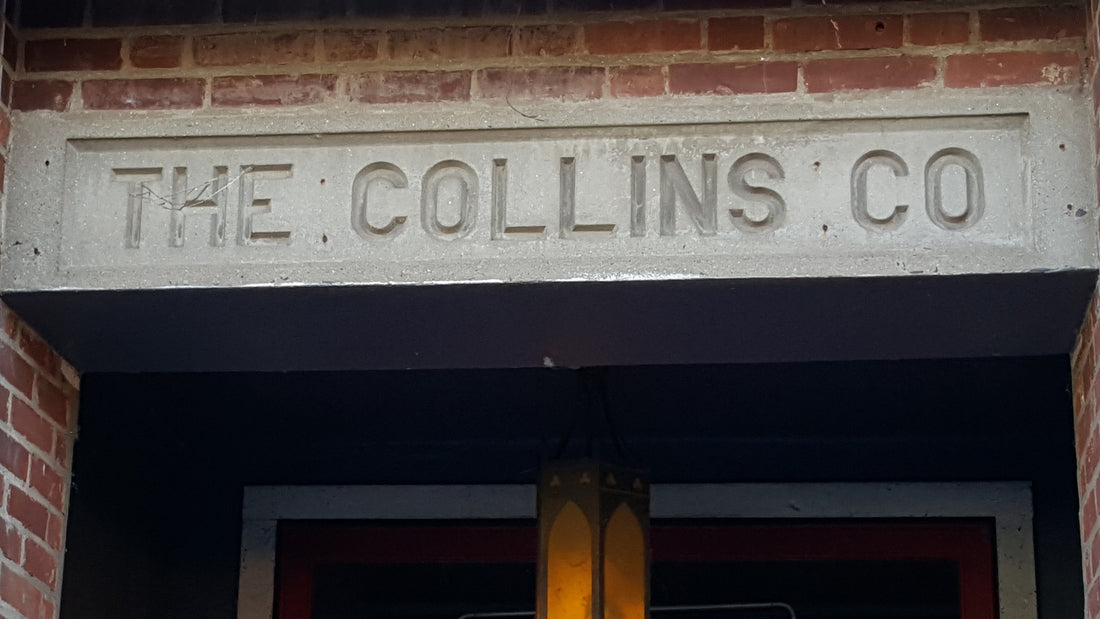In mid-July we visited the remains of the Collins Company in Collinsville, Connecticut. In the late 1800’s, the Collins Company was the largest integrated axe manufacturer in the world.
Founder Samuel Collins’ vision of a global edge tool company built on the banks of the Farmington River is still in evidence today.

[Packing Shop and Bell Tower Building]
Samuel, his brother David, and cousin William Wells bought a five-acre site in what was then South Canton, Connecticut in 1826. Samuel’s insistence on making the best quality axes and selling them sharpened, honed and hafted led to quick company growth. In 1826 eight employees were making around eight axes a day. By 1828, trip hammers were introduced to speed production; by 1832 they had built 35 houses for their growing workforce and renamed the town Colllinsville; by 1845 they were producing machetes and other edge tools for the South and Central American markets; in 1859 the company sold pikes to John Brown which were used in his attack on Harper's Ferry; by 1864 steam powered the trip hammers making swords and bayonets for the Union in the Civil War. At the time of Samuel Collins death in 1871 the company had made 15 million axes and had annual sales of $1 million.
Twenty-eight of the original buildings remain of the original Collins factory. Many others were destroyed in a disastrous flood in 1955. The complex was laid out along the river with the casting operations to the south, the forging and finishing taking place in the center and the packing and shipping operations on the north side by the railroad depot.

[Polishing Shop]
The Collins Company made much more than axes. They made scythes, adzes, plows, bayonets, sabers and Bowie knives. For the South and Central American markets they made 150 varieties of machetes and other specialty tools for fruit harvesting. Axes were made in Michigan, Connecticut, Dayton and Yankee patterns. Double bit axes and hatchets were also in among the 1,300 edge tools in its product line.

[One of many displays at the Canton Historical Society Museum, Collinsville, CT]
The Collins Company was also known for its “Legitimus” trademark which was put not only on axes but on its other edge tools.

The quality and popularity of Collins’ products led the company to vigorously defend the Legitimus mark against counterfeits and also forego paper labels to have the mark stamped on its products. In addition to the Legitimus brand, Collins marketed its products under the Dynamicut, King, Homestead, Old Timer, Hercules, Red Seal and Commander names.
A devastating flood in 1955 destroyed one-third of the buildings at the Collins factory. It was a loss from which the company never really recovered. In 1966, operations ceased in Collinsville. The domestic business was sold to Mann Edge Tool of Lewistown, Pennsylvania. It’s South American operations were sold to Stanley Tool. The site is now home to about 40 tenants including an antique shop, artist studios, carpentry and wood working businesses.
The Canton Historical Society housed in the old Collins plow shop has many great displays on the company, its product, and local history.
N.B. The museum also had a working comptrometer which was an early version of a calculator. My Grandmother Doughty used one of these in the 1930's to figure payroll at the Westinghouse Air Brake plant in Wilmerding, PA!



